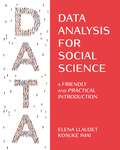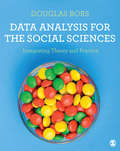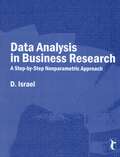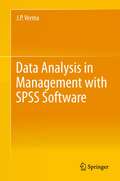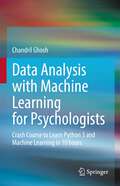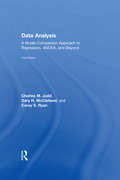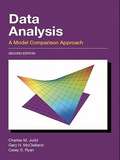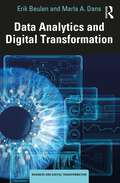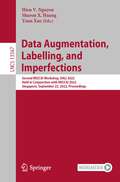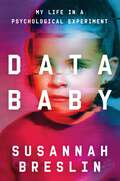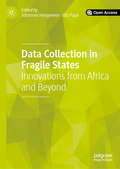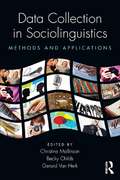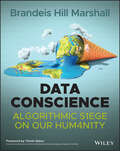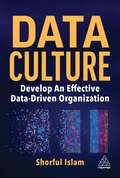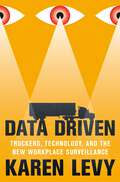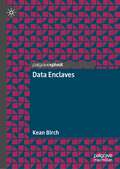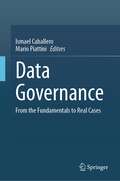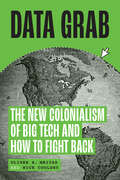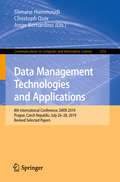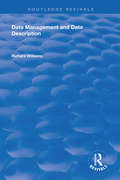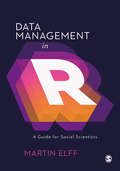- Table View
- List View
Data Analysis for Social Science: A Friendly and Practical Introduction
by Kosuke Imai Elena LlaudetAn ideal textbook for complete beginners—teaches from scratch R, statistics, and the fundamentals of quantitative social scienceData Analysis for Social Science provides a friendly introduction to the statistical concepts and programming skills needed to conduct and evaluate social scientific studies. Assuming no prior knowledge of statistics and coding and only minimal knowledge of math, the book teaches the fundamentals of survey research, predictive models, and causal inference while analyzing data from published studies with the statistical program R. It teaches not only how to perform the data analyses but also how to interpret the results and identify the analyses&’ strengths and limitations.Progresses by teaching how to solve one kind of problem after another, bringing in methods as needed. It teaches, in this order, how to (1) estimate causal effects with randomized experiments, (2) visualize and summarize data, (3) infer population characteristics, (4) predict outcomes, (5) estimate causal effects with observational data, and (6) generalize from sample to population.Flips the script of traditional statistics textbooks. It starts by estimating causal effects with randomized experiments and postpones any discussion of probability and statistical inference until the final chapters. This unconventional order engages students by demonstrating from the very beginning how data analysis can be used to answer interesting questions, while reserving more abstract, complex concepts for later chapters.Provides a step-by-step guide to analyzing real-world data using the powerful, open-source statistical program R, which is free for everyone to use. The datasets are provided on the book&’s website so that readers can learn how to analyze data by following along with the exercises in the book on their own computer.Assumes no prior knowledge of statistics or coding.Specifically designed to accommodate students with a variety of math backgrounds. It includes supplemental materials for students with minimal knowledge of math and clearly identifies sections with more advanced material so that readers can skip them if they so choose.Provides cheatsheets of statistical concepts and R code.Comes with instructor materials (upon request), including sample syllabi, lecture slides, and additional replication-style exercises with solutions and with the real-world datasets analyzed. Looking for a more advanced introduction? Consider Quantitative Social Science by Kosuke Imai. In addition to covering the material in Data Analysis for Social Science, it teaches diffs-in-diffs models, heterogeneous effects, text analysis, and regression discontinuity designs, among other things.
Data Analysis for the Social Sciences: Integrating Theory and Practice
by Professor Douglas Bors'This book fosters in-depth understanding of the logic underpinning the most common statistical tests within the behavioural sciences. By emphasising the shared ground between these tests, the author provides crucial scaffolding for students as they embark upon their research journey.' —Ruth Horry, Psychology, Swansea University 'This unique text presents the conceptual underpinnings of statistics as well as the computation and application of statistics to real-life situations--a combination rarely covered in one book. A must-have for students learning statistical techniques and a go-to handbook for experienced researchers.' —Barbra Teater, Social Work, College of Staten Island, City University of New York Accessible, engaging, and informative, this book will help any social science student approach statistics with confidence. With a well-paced and well-judged integrated approach rather than a simple linear trajectory, this book progresses at a realistic speed that matches the pace at which statistics novices actually learn. Packed with global, interdisciplinary examples that ground statistical theory and concepts in real-world situations, it shows students not only how to apply newfound knowledge using IBM SPSS Statistics, but also why they would want to. Spanning statistics basics like variables, constants, and sampling through to t-tests, multiple regression and factor analysis, it builds statistical literacy while also covering key research principles like research questions, error types and results reliability. It shows you how to: Describe data with graphs, tables, and numbers Calculate probability and value distributions Test a priori and post hoc hypotheses Conduct Chi-squared tests and observational studies Structure ANOVA, ANCOVA, and factorial designs Supported by lots of visuals and a website with interactive demonstrations, author video, and practice datasets, this book is the student-focused companion to support students through their statistics journeys.
Data Analysis for the Social Sciences: Integrating Theory and Practice
by Professor Douglas Bors'This book fosters in-depth understanding of the logic underpinning the most common statistical tests within the behavioural sciences. By emphasising the shared ground between these tests, the author provides crucial scaffolding for students as they embark upon their research journey.' —Ruth Horry, Psychology, Swansea University 'This unique text presents the conceptual underpinnings of statistics as well as the computation and application of statistics to real-life situations--a combination rarely covered in one book. A must-have for students learning statistical techniques and a go-to handbook for experienced researchers.' —Barbra Teater, Social Work, College of Staten Island, City University of New York Accessible, engaging, and informative, this book will help any social science student approach statistics with confidence. With a well-paced and well-judged integrated approach rather than a simple linear trajectory, this book progresses at a realistic speed that matches the pace at which statistics novices actually learn. Packed with global, interdisciplinary examples that ground statistical theory and concepts in real-world situations, it shows students not only how to apply newfound knowledge using IBM SPSS Statistics, but also why they would want to. Spanning statistics basics like variables, constants, and sampling through to t-tests, multiple regression and factor analysis, it builds statistical literacy while also covering key research principles like research questions, error types and results reliability. It shows you how to: Describe data with graphs, tables, and numbers Calculate probability and value distributions Test a priori and post hoc hypotheses Conduct Chi-squared tests and observational studies Structure ANOVA, ANCOVA, and factorial designs Supported by lots of visuals and a website with interactive demonstrations, author video, and practice datasets, this book is the student-focused companion to support students through their statistics journeys.
Data Analysis in Business Research: A Step-By-Step Nonparametric Approach (Response Books)
by D IsraelWhile there are books focusing on parametric tests, the domain of nonparametric tests is mostly unexplored. Data Analysis in Business Research: A Step by Step Nonparametric Approach brings under one umbrella all the major nonparametric statistical tools that can be used by undergraduate and postgraduate students of all disciplines, especially students of Research Methods in Social Sciences and Management Studies, in their dissertation work. Students face difficulty in analyzing data collected from small samples; they end up reporting mere percentage analysis which results in the loss of information collected. Hence there is a need to create awareness among students and researchers about the application of major nonparametric tools that can be applied confidently without worrying about sample size, scale of measurement, normality assumptions or other parameters of that nature. The lucid presentation of the step-by-step procedures, explaining in simple English how to perform each of the major nonparametric tests, is a major attraction of the book. The book, which also has a comprehensive question bank, assumes minimal or little knowledge of statistics on the part of the reader. This book will also be informative for Marketing Research professionals and organisations, consultancies and organisations of economic research.
Data Analysis in Management with SPSS Software
by J. P. VermaThis book provides readers with a greater understanding of a variety of statistical techniques along with the procedure to use the most popular statistical software package SPSS. It strengthens the intuitive understanding of the material, thereby increasing the ability to successfully analyze data in the future. The book provides more control in the analysis of data so that readers can apply the techniques to a broader spectrum of research problems. This book focuses on providing readers with the knowledge and skills needed to carry out research in management, humanities, social and behavioural sciences by using SPSS.
Data Analysis with Machine Learning for Psychologists: Crash Course to Learn Python 3 and Machine Learning in 10 hours
by Chandril GhoshThe power of data drives the digital economy of the 21st century. It has been argued that data is as vital a resource as oil was during the industrial revolution. An upward trend in the number of research publications using machine learning in some of the top journals in combination with an increasing number of academic recruiters within psychology asking for Python knowledge from applicants indicates a growing demand for these skills in the market. While there are plenty of books covering data science, rarely, if ever, books in the market address the need of social science students with no computer science background. They are typically written by engineers or computer scientists for people of their discipline. As a result, often such books are filled with technical jargon and examples irrelevant to psychological studies or projects. In contrast, this book was written by a psychologist in a simple, easy-to-understand way that is brief and accessible. The aim for this book was to make the learning experience on this topic as smooth as possible for psychology students/researchers with no background in programming or data science. Completing this book will also open up an enormous amount of possibilities for quantitative researchers in psychological science, as it will enable them to explore newer types of research questions.
Data Analysis: A Model Comparison Approach To Regression, ANOVA, and Beyond, Third Edition
by Charles M. Judd Carey S. Ryan Gary H. McClellandData Analysis: A Model Comparison Approach to Regression, ANOVA, and Beyond is an integrated treatment of data analysis for the social and behavioral sciences. It covers all of the statistical models normally used in such analyses, such as multiple regression and analysis of variance, but it does so in an integrated manner that relies on the comparison of models of data estimated under the rubric of the general linear model. Data Analysis also describes how the model comparison approach and uniform framework can be applied to models that include product predictors (i.e., interactions and nonlinear effects) and to observations that are nonindependent. Indeed, the analysis of nonindependent observations is treated in some detail, including models of nonindependent data with continuously varying predictors as well as standard repeated measures analysis of variance. This approach also provides an integrated introduction to multilevel or hierarchical linear models and logistic regression. Finally, Data Analysis provides guidance for the treatment of outliers and other problematic aspects of data analysis. It is intended for advanced undergraduate and graduate level courses in data analysis and offers an integrated approach that is very accessible and easy to teach. Highlights of the third edition include: a new chapter on logistic regression; expanded treatment of mixed models for data with multiple random factors; updated examples; an enhanced website with PowerPoint presentations and other tools that demonstrate the concepts in the book; exercises for each chapter that highlight research findings from the literature; data sets, R code, and SAS output for all analyses; additional examples and problem sets; and test questions.
Data Analysis: A Model Comparison Approach, Second Edition
by Charles M. Judd Carey S. Ryan Gary H. McclellandThis completely rewritten classic text features many new examples, insights and topics including mediational, categorical, and multilevel models. Substantially reorganized, this edition provides a briefer, more streamlined examination of data analysis. Noted for its model-comparison approach and unified framework based on the general linear model, the book provides readers with a greater understanding of a variety of statistical procedures. This consistent framework, including consistent vocabulary and notation, is used throughout to develop fewer but more powerful model building techniques. The authors show how all analysis of variance and multiple regression can be accomplished within this framework. The model-comparison approach provides several benefits: It strengthens the intuitive understanding of the material thereby increasing the ability to successfully analyze data in the future It provides more control in the analysis of data so that readers can apply the techniques to a broader spectrum of questions It reduces the number of statistical techniques that must be memorized It teaches readers how to become data analysts instead of statisticians. The book opens with an overview of data analysis. All the necessary concepts for statistical inference used throughout the book are introduced in Chapters 2 through 4. The remainder of the book builds on these models. Chapters 5 - 7 focus on regression analysis, followed by analysis of variance (ANOVA), mediational analyses, non-independent or correlated errors, including multilevel modeling, and outliers and error violations. The book is appreciated by all for its detailed treatment of ANOVA, multiple regression, nonindependent observations, interactive and nonlinear models of data, and its guidance for treating outliers and other problematic aspects of data analysis. Intended for advanced undergraduate or graduate courses on data analysis, statistics, and/or quantitative methods taught in psychology, education, or other behavioral and social science departments, this book also appeals to researchers who analyze data. A protected website featuring additional examples and problems with data sets, lecture notes, PowerPoint presentations, and class-tested exam questions is available to adopters. This material uses SAS but can easily be adapted to other programs. A working knowledge of basic algebra and any multiple regression program is assumed.
Data Analytics and Digital Transformation (Business and Digital Transformation)
by Erik Beulen Marla A. DansUnderstanding the significance of data analytics is paramount for digital transformation but in many organizations they are separate units without fully aligned goals. As organizations are applying digital transformations to be adaptive and agile in a competitive environment, data analytics can play a critical role in their success. This book explores the crossroads between them and how to leverage their connection for improved business outcomes. The need to collaborate and share data is becoming an integral part of digital transformation. This not only creates new opportunities but also requires well-considered and continuously assessed decision-making as competitiveness is at stake. This book details approaches, concepts, and frameworks, as well as actionable insights and good practices, including combined data management and agile concepts. Critical issues are discussed such as data quality and data governance, as well as compliance, privacy, and ethics. It also offers insights into how both private and public organizations can innovate and keep up with growing data volumes and increasing technological developments in the short, mid, and long term. This book will be of direct appeal to global researchers and students across a range of business disciplines, including technology and innovation management, organizational studies, and strategic management. It is also relevant for policy makers, regulators, and executives of private and public organizations looking to implement successful transformation policies.
Data Augmentation, Labelling, and Imperfections: Second MICCAI Workshop, DALI 2022, Held in Conjunction with MICCAI 2022, Singapore, September 22, 2022, Proceedings (Lecture Notes in Computer Science #13567)
by Hien V. Nguyen Yuan Xue Sharon X. HuangThis book constitutes the refereed proceedings of the Second MICCAI Workshop on Data Augmentation, Labelling, and Imperfections, DALI 2022, held in conjunction with MICCAI 2022, in Singapore in September 2022.DALI 2022 accepted 12 papers from the 22 submissions that were reviewed. The papers focus on rigorous study of medical data related to machine learning systems.
Data Baby: My Life in a Psychological Experiment
by Susannah BreslinA Belletrist Book Pick for December 2023Lab Girl meets Brain on Fire in this provocative and poignant memoir delving into a woman's formative experiences as a veritable "lab rat" in a lifelong psychological study, and her pursuit to reclaim autonomy and her identity as a adult. What if your parents turn you into a human lab rat when you&’re a child? Will that change the story of your life? Will that change who you are? When Susannah Breslin is a toddler, her parents enroll her in an exclusive laboratory preschool at the University of California, Berkeley, where she becomes one of over a hundred children who are research subjects in an unprecedented thirty-year study of personality development that predicts who she and her cohort will grow up to be. Decades later, trapped in what she feels is an abusive marriage and battling breast cancer, she starts to wonder how growing up under a microscope shaped her identity and life choices. Already a successful journalist, she makes her own curious history the subject of her next investigation. From experiment rooms with one-way mirrors, to children&’s puzzles with no solutions, to condemned basement laboratories, her life-changing journey uncovers the long-buried secrets hidden behind the renowned study. The question at the gnarled heart of her quest: Did the study know her better than she knew herself? At once bravely honest and sharply witty, Data Baby is a compelling and provocative account of a woman&’s quest to find her true self, and an unblinking exploration of why we turn out as we do. Few people in all of history have been studied from such a young age and for as long as this author, but the message of her book is universal. In an era when so many of us are looking to technology to tell us who to be, it&’s up to us to discover who we actually are.
Data Collection in Fragile States: Innovations from Africa and Beyond
by Johannes Hoogeveen Utz Pape‘This open access book addresses an urgent issue on which little organized information exists. It reflects experience in Africa but is highly relevant to other fragile states as well.’ —Constantine Michalopoulos, John Hopkins University, USA and former Director of Economic Policy and Co-ordination at the World BankFragile countries face a triple data challenge. Up-to-date information is needed to deal with rapidly changing circumstances and to design adequate responses. Yet, fragile countries are among the most data deprived, while collecting new information in such circumstances is very challenging. This open access book presents innovations in data collection developed with decision makers in fragile countries in mind. Looking at innovations in Africa from mobile phone surveys monitoring the Ebola crisis, to tracking displaced people in Mali, this collection highlights the challenges in data collection researchers face and how they can be overcome.
Data Collection in Sociolinguistics: Methods and Applications
by Gerard Van Herk Christine Mallinson Becky ChildsThis edited volume provides up-to-date, succinct, relevant, and informative discussion about methods of data collection in sociolinguistic research. It covers the main areas of research design, conducting research, and sharing data findings with longer chapters and shorter vignettes written by a range of top sociolinguists, both veteran and emerging scholars. Here is the one-stop, go-to guide for the numerous quantitative, qualitative, and mixed methods that are used in sociolinguistic research, ensuring that Data Collection in Sociolinguistics will be not only useful in the classroom but also as a reference tool for active researchers. For more information, visit sociolinguisticdatacollection.com.
Data Conscience: Algorithmic Siege on our Humanity
by Brandeis Hill MarshallDATA CONSCIENCE ALGORITHMIC S1EGE ON OUR HUM4N1TY EXPLORE HOW D4TA STRUCTURES C4N HELP OR H1NDER SOC1AL EQU1TY Data has enjoyed ‘bystander’ status as we’ve attempted to digitize responsibility and morality in tech. In fact, data’s importance should earn it a spot at the center of our thinking and strategy around building a better, more ethical world. It’s use—and misuse—lies at the heart of many of the racist, gendered, classist, and otherwise oppressive practices of modern tech. In Data Conscience: Algorithmic Siege on our Humanity, computer science and data inclusivity thought leader Dr. Brandeis Hill Marshall delivers a call to action for rebel tech leaders, who acknowledge and are prepared to address the current limitations of software development. In the book, Dr. Brandeis Hill Marshall discusses how the philosophy of “move fast and break things” is, itself, broken, and requires change. You’ll learn about the ways that discrimination rears its ugly head in the digital data space and how to address them with several known algorithms, including social network analysis, and linear regression A can’t-miss resource for junior-level to senior-level software developers who have gotten their hands dirty with at least a handful of significant software development projects, Data Conscience also provides readers with: Discussions of the importance of transparency Explorations of computational thinking in practice Strategies for encouraging accountability in tech Ways to avoid double-edged data visualization Schemes for governing data structures with law and algorithms
Data Culture: Develop An Effective Data-Driven Organization
by Dr Shorful IslamOrganizations often start their data journey by either procuring the technology or hiring the people. However, without an effective data-driven culture in place, they can struggle to derive value from their investments.Data Culture explores how data leaders can develop and nurture a data-driven culture tailored to their organization's needs. It outlines the types of data leadership and teams needed and the key building blocks for success, such as team recruitment, building and training, leadership, process, behavioural change management, developing, sustaining and measuring a data culture, company values and everyday decision making. It also explores the nuances of how different types of data cultures work with different types of companies, what to avoid and the differences between building a data culture from scratch and changing an existing data culture from within.With this hands-on guide, senior data leader Shorful Islam takes readers through how to successfully establish or change a data culture, sharing his expertise in behavioural change psychology and two decades of experience in fostering data culture in organizations. Supported throughout by real-world examples and cases, this will be an essential read for all data leaders and anyone involved in developing a data-driven organizational culture.
Data Distribution: Managing the Environment (Routledge Revivals #Vol. 4)
by Richard WilliamsPublished in 1992. Business information has evolved from typewriter/card index (decentralized) through the era of DP Department and mainframe (centralized) to present mix with PCs and networks (distributed). This book demonstrates how data distribution can function in the best interests of organizations, through a managed environment. It looks at what is needed from the systems professionals to support current methods; reporting actual experience, defining techniques, and examining the opportunities and challenges.
Data Driven: Truckers, Technology, and the New Workplace Surveillance
by Karen LevyA behind-the-scenes look at how digital surveillance is affecting the trucking way of lifeLong-haul truckers are the backbone of the American economy, transporting goods under grueling conditions and immense economic pressure. Truckers have long valued the day-to-day independence of their work, sharing a strong occupational identity rooted in a tradition of autonomy. Yet these workers increasingly find themselves under many watchful eyes. Data Driven examines how digital surveillance is upending life and work on the open road, and raises crucial questions about the role of data collection in broader systems of social control.Karen Levy takes readers inside a world few ever see, painting a bracing portrait of one of the last great American frontiers. Federal regulations now require truckers to buy and install digital monitors that capture data about their locations and behaviors. Intended to address the pervasive problem of trucker fatigue by regulating the number of hours driven each day, these devices support additional surveillance by trucking firms and other companies. Traveling from industry trade shows to law offices and truck-stop bars, Levy reveals how these invasive technologies are reconfiguring industry relationships and providing new tools for managerial and legal control—and how truckers are challenging and resisting them.Data Driven contributes to an emerging conversation about how technology affects our work, institutions, and personal lives, and helps to guide our thinking about how to protect public interests and safeguard human dignity in the digital age.
Data Enclaves
by Kean BirchThis book focuses on our increasing dependence upon Big Tech to live, manage, and enjoy our lives. The author examines how we freely exchange our personal data for access to online platforms, services, and devices without proper consideration of the implications of this trade. Our personal data is the defining resource of the emerging digital economy, and it is increasingly concentrated in a few data enclaves controlled by Big Tech firms, cementing an increasingly parasitic form of technoscientific innovation. Big Tech controls access to these data, dictates the terms of our use of their services and products, and controls the future development of key technologies like artificial intelligence. The contention of this book is that we need to rethink our political and policy approach to data governance and to do so requires unpacking the peculiarities of personal data and how personal data are transformed into a valuable asset.
Data Governance: From the Fundamentals to Real Cases
by Mario Piattini Ismael CaballeroThis book presents a set of models, methods, and techniques that allow the successful implementation of data governance (DG) in an organization and reports real experiences of data governance in different public and private sectors. To this end, this book is composed of two parts. Part I on “Data Governance Fundamentals” begins with an introduction to the concept of data governance that stresses that DG is not primarily focused on databases, clouds, or other technologies, but that the DG framework must be understood by business users, systems personnel, and the systems themselves alike. Next, chapter 2 addresses crucial topics for DG, such as the evolution of data management in organizations, data strategy and policies, and defensive and offensive approaches to data strategy. Chapter 3 then details the central role that human resources play in DG, analysing the key responsibilities of the different DG-related roles and boards, while chapter 4 discusses the most common barriers to DG in practice. Chapter 5 summarizes the paradigm shifts in DG from control to value creation. Subsequently chapter 6 explores the needs, characteristics and key functionalities of DG tools, before this part ends with a chapter on maturity models for data governance. Part II on “Data Governance Applied” consists of five chapters which review the situation of DG in different sectors and industries. Details about DG in the banking sector, public administration, insurance companies, healthcare and telecommunications each are presented in one chapter. The book is aimed at academics, researchers and practitioners (especially CIOs, Data Governors, or Data Stewards) involved in DG. It can also serve as a reference for courses on data governance in information systems.
Data Grab: The New Colonialism of Big Tech and How to Fight Back
by Nick Couldry Ulises A. MejiasA compelling argument that the extractive practices of today’s tech giants are the continuation of colonialism—and a crucial guide to collective resistance. Large technology companies like Meta, Amazon, and Alphabet have unprecedented access to our daily lives, collecting information when we check our email, count our steps, shop online, and commute to and from work. Current events are concerning—both the changing owners (and names) of billion-dollar tech companies and regulatory concerns about artificial intelligence underscore the sweeping nature of Big Tech’s surveillance and the influence such companies hold over the people who use their apps and platforms. As trusted tech experts Ulises A. Mejias and Nick Couldry show in this eye-opening and convincing book, this vast accumulation of data is not the accidental stockpile of a fast-growing industry. Just as nations stole territories for ill-gotten minerals and crops, wealth, and dominance, tech companies steal personal data important to our lives. It’s only within the framework of colonialism, Mejias and Couldry argue, that we can comprehend the full scope of this heist. Like the land grabs of the past, today’s data grab converts our data into raw material for the generation of corporate profit against our own interests. Like historical colonialism, today’s tech corporations have engineered an extractive form of doing business that builds a new social and economic order, leads to job precarity, and degrades the environment. These methods deepen global inequality, consolidating corporate wealth in the Global North and engineering discriminatory algorithms. Promising convenience, connection, and scientific progress, tech companies enrich themselves by encouraging us to relinquish details about our personal interactions, our taste in movies or music, and even our health and medical records. Do we have any other choice? Data Grab affirms that we do. To defy this new form of colonialism we will need to learn from previous forms of resistance and work together to imagine entirely new ones. Mejias and Couldry share the stories of voters, workers, activists, and marginalized communities who have successfully opposed unscrupulous tech practices. An incisive discussion of the digital media that’s transformed our world, Data Grab is a must-read for anyone concerned about privacy, self-determination, and justice in the internet age.
Data Management Technologies and Applications: 8th International Conference, DATA 2019, Prague, Czech Republic, July 26–28, 2019, Revised Selected Papers (Communications in Computer and Information Science #1255)
by Slimane Hammoudi Jorge Bernardino Christoph QuixThis book constitutes the thoroughly refereed proceedings of the 8th International Conference on Data Management Technologies and Applications, DATA 2019, held in Prague, Czech Republic, in July 2019. The 8 revised full papers were carefully reviewed and selected from 90 submissions. The papers deal with the following topics: decision support systems, data analytics, data and information quality, digital rights management, big data, knowledge management, ontology engineering, digital libraries, mobile databases, object-oriented database systems, and data integrity.
Data Management and Data Description (Routledge Revivals)
by Richard WilliamsPublished in 1992. The author sets out the main issues in Data Management, from the first principles of meta modelling and data description through the comprehensive management exploitation, re-use, valuation, extension and enhancement of data as a valuable organizational resource. Using his recent in-depth experience of a major trans-European project, he highlights data value metrics and provides examples of extended data analysis to assist readers to produce corporate data architectures. The book considers how the techniques of data management can be applied in the wider community of business, institutional and organizational settings and considers how new types of data (from the EDIFACT world) can be integrated into the existing data management environments of large data processing functions. This wide-ranging text considers existing work in the field of data resource management and extends the concepts of data resource valuation. References are made to new aspects of metrics for data value and how they can be applied. It will interest strategic business planners, information systems, and DP managers and executives, data-management personnel and data analysts, and academics involved in MSc and BSc courses on Dara Analysis, CASE repositories and structured methods.
Data Management in R: A Guide for Social Scientists
by Martin ElffAn invaluable, step-by-step guide to data management in R for social science researchers. This book will show you how to recode data, combine data from different sources, document data, and import data from statistical packages other than R. It explores both qualitative and quantitative data and is packed with a range of supportive learning features such as code examples, overview boxes, images, tables, and diagrams.
Data Management in R: A Guide for Social Scientists
by Martin ElffAn invaluable, step-by-step guide to data management in R for social science researchers. This book will show you how to recode data, combine data from different sources, document data, and import data from statistical packages other than R. It explores both qualitative and quantitative data and is packed with a range of supportive learning features such as code examples, overview boxes, images, tables, and diagrams.
Data Money: Inside Cryptocurrencies, Their Communities, Markets, and Blockchains
by Koray CaliskanThe cryptocurrency world has transformed in a few short years from a niche subculture to a parallel economic universe, reaching a market capitalization of more than $2.5 trillion in 2021 before plummeting in 2022. For their advocates, cryptocurrencies represent a revolution of world-historical significance. To critics, crypto is more of a speculative tool than a true currency. How do tens of thousands of financial actors make these new monies? What forces give cryptocurrencies their value—or take it away? And what does crypto’s spectacular ascent reveal about the nature of money? In this groundbreaking ethnographic analysis of crypto economies and their global markets and communities, Koray Caliskan offers an inside view of how cryptocurrencies are made and traded. He argues that cryptocurrency should be understood as “data money,” a historically novel money type, created as the right to send data privately over an accounting infrastructure called blockchain. Drawing on two years of fieldwork among global cryptocurrency communities and in crypto markets, Caliskan makes visible the production principles of cryptocurrencies and explores how crypto exchanges work from within. He explains why and how we have been misunderstanding, underregulating, and improperly taxing crypto exchanges and actors. He also proposes a radically new way to make sense of new finance and its actors. An invaluable book for all readers seeking to understand cryptocurrency, Data Money sheds new light on a profound transformation of finance and its possible future trajectories.
